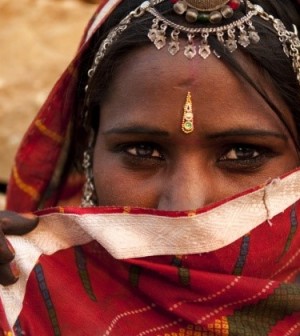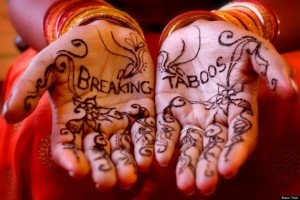- Finding Unshakable Power in a World That Wants to Pull Us ApartPosted 5 months ago
- What could a Donald Trump presidency mean for abortion rights?Posted 5 months ago
- Financial Empowerment: The Game-Changer for Women in Relationships and BeyondPosted 6 months ago
- Mental Health and Wellbeing Tips During and After PregnancyPosted 6 months ago
- Fall Renewal: Step outside your Comfort Zone & Experience Vibrant ChangePosted 6 months ago
- Women Entrepreneurs Need Support SystemsPosted 6 months ago
Saris, Apologies and Sacrifice: The story of South Asian Women

Written by Nina Ganguli
As an adolescent girl, my father would regularly tell me that Indian women don’t do this and don’t do that, they don’t smoke, they don’t argue, they don’t drink their alcohol out of a bottle. They don’t swear. A woman makes or breaks a relationship. A woman shouldn’t have a life outside her marriage and the list goes on.
Strange how he never once mentioned what Indian men shouldn’t do. For instance, they shouldn’t abuse their wives, they shouldn’t abuse their daughters. They shouldn’t beat their sons and have a holier than thou attitude. He never mentioned that they shouldn’t unload the responsibility for their actions and insecurities on the women and children around them.
 Some may argue that this isn’t an Indian male ideology; it’s just my father’s. But I have read and seen enough to know that it is. You don’t have to look very far to see that Indian men regularly shirk their responsibilities, laying it all in the hands of women. Look at the Delhi rapist, while what he said was abhorrent and disturbing, it is a mindset of more men then we would like to admit. It’s the reason the Taliban shot Malala. We can go into the Indian villages of today and still see sati prevailing, as well as the dowry system and let’s not forget about female feticide. In some cases you don’t have to as far as the villages. Females are considered less than second class citizens and yet we carry the burden that society has placed on us. Be virtuous, uphold the family name an honour, and sacrifice for the family you are born into and the family you marry into.
Some may argue that this isn’t an Indian male ideology; it’s just my father’s. But I have read and seen enough to know that it is. You don’t have to look very far to see that Indian men regularly shirk their responsibilities, laying it all in the hands of women. Look at the Delhi rapist, while what he said was abhorrent and disturbing, it is a mindset of more men then we would like to admit. It’s the reason the Taliban shot Malala. We can go into the Indian villages of today and still see sati prevailing, as well as the dowry system and let’s not forget about female feticide. In some cases you don’t have to as far as the villages. Females are considered less than second class citizens and yet we carry the burden that society has placed on us. Be virtuous, uphold the family name an honour, and sacrifice for the family you are born into and the family you marry into.
What I don’t understand and what is frustrating to me is that Hinduism the predominant religion in India, where many of the deities are female. These men are praying to them, Luxmi, Dhurga, Parvati, Kali and Sarasvati, yet these same men return to their homes and mistreat the women that these Goddesses represent.
Women are seen as objects and not human. Things to be had and kept, then we must apologize when we begin to realize that we are more than objects. We cry silently amongst ourselves, fearful of being the godesses we were born and designed to be.
In my own home, we all cowered under the rule of my father, an educated man, with a good job, and all the makings of a “decent” man, who spent his growing years in the cosmopolitan cities of Kolkata, Mumbai and Frankfurt and the rest of his years in Canada. You would think that he would have had a more forward thinking mentality however; his views on women’s roles and responsibilities disempowered his wife and his daughter; so much so that both my mother and I were stunted in our growth. Even when I was married and had my own household, his hold was still there. Not until his death were we released from the chains of his thinking and doing.
This is not a unique story. The statistics are astounding on domestic and sexual violence on South Asian women. In India we are just beginning to finally dialogue on women’s rights. But what’s going on here in Canada, in Mississauga and Brampton, where there is a very large population of South Asians? We think that because we have come abroad, that we are more enlightened, but I think it’s quite the opposite. I believe that as South Asian’s endeavor with all their might to hang on to their heritage and culture, they also hold onto the narrow mindset of women’s roles and responsibilities.
What is an even more disturbing issue is when women’s mindsets are the same as the men and believe they are the lesser of the two genders. Gender inequality not only prevails in the mindset of men, it is also adopted by many women. The worst thing a woman can do to another woman is kill her spirit. As women, specifically South Asian women, we must put aside that instinctual female competiveness and understand that we all have the right to have an equal space on this earth. We must stand together, feel secure in the fact that we can cry on one another’s shoulders and hold each other up. We must give each other the courage to make different choices, to let go of jealousy and position. We must empower ourselves and others to make a stand against inequality, to stop apologizing for being a woman and start embracing the divine goddesses we are.
My South Asian Sisters, we must individually change our ‘‘I can’t’’ thinking into ‘’I can’’ thinking and empower other women to do the same. Let us stand together NOW to show the world how to treat us by treating ourselves and one another, with the deepest love and respect. Together we can make the difference the world needs to see!
It is my honour to serve you! God Bless!
Have questions or comments?
I would love to hear from you.
Email me at: nina@theapostropheproject.com
 If you think you can or you think you can’t, either way you’re correct – Henry Ford
If you think you can or you think you can’t, either way you’re correct – Henry Ford
Many women don’t step into their power or leverage their greatest skills because they don’t think that they can! I know what it’s like to have unleashed potential hidden inside you. I am an abuse survivor, I have endured sexual abuse, physical abuse and emotional abuse. I have come from a place of I can’t, simply because some told me I couldn’t. But here is the beautiful piece of the story, all of what I believed is something that I chose to believe, regardless if it was conscious or unconscious, I still chose to believe them. That means I can choose to change those beliefs and so can you. Perception is the single most influential factor that directly impacts and determines how and what you think and results in the life you do or not have. The cliché is true! If you change your thinking you CAN change your life!
Nina has over 20 years of performance management experience and has helped many people and teams change the way they think to achieve their personal and professional goals. She is trained and certified in Change Management, Project Management, and Life Coaching and holds a degree in Psychology. She is also the author of the soon to be released book: Confessions of a Can’t-aholic: How to Change Your “I Can’t” into “I Can!” (2015). Along with her own life experience she can help you to move from “I Can’t” to “I CAN!” The result will ignite your power to create and live the life you’ve always dreamed of!






